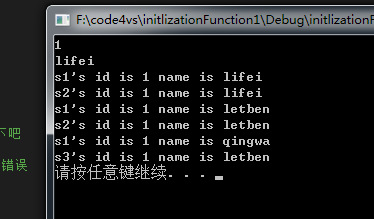复制构造函数
2016-03-18 17:20
309 查看
主要是想说复制构造函数的,但是偏偏问题就来了。所以还介绍了
passing 'const Student' as 'this' argument of 'int Student::getId()' discards qualifiers [-fpermissive]
error:passing ‘const LineList<int>’ as ‘this’ argument of ‘void LineList<T>::Out(ostream&) [with T = int]’ discards qualifiers
这个问题。
解决方案:来自博客:/article/2957861.html
写的十分靠谱。
原文问题:
error:passing ‘const LineList<int>’ as ‘this’ argument of ‘void LineList<T>::Out(ostream&) [with T = int]’ discards qualifiers
“意思是说 在一个加了const限定符的成员函数中,不能够调用 非const成员函数。
因为如果调用了非const成员函数,就违反了const成员函数不改变对象的规定。
而error:...discards qualifiers 的意思就是缺少限定符
因此,他的解决办法很简单了 ,只要将checkElements()函数申明改为 checkElements()const就行了
”
——rainkin1993
换成自己的话再说一遍就是:
我们在拷贝构造函数中使用了(const student &st)一个student的对象,并且他是const的。所以要求对于在使用过程里面的st所要调用的函数也必须是const的。
举例:
正常情况下:
student.h 中:
int getId(void);
student.cpp中:
int student::getId(void){
return this->id;
}
拷贝构造函数中:
student::student(student &st){
this->id = st.getId();
}
上面这一套写法通过。
修改:
拷贝构造函数中:原来的st中的内容必然不能变化所以:
student::student(const student &st){
this->id = st.getId();
}
//这样在QT中就会报discards qualifiers [-fpermissive]错误。
解决方式:
student.h 中:
int getId(void)const;
student.cpp中:
int student::getId(void)const{
return this->id;
}
这是这里面一个cosnt的用法,比起C语言来讲又多了一个点,就像extern一样有双重含义。
关于深浅拷贝:http://www.cnblogs.com/BlueTzar/articles/1223313.html
在vs中实现的,因为在QT里面忘记了字符串复制的时候忘记进行初始化了,总之同样的代码貌似对于我来说,vs更好上手。QT有点儿看不懂它提示的错误。但是QT里面的“.”能自动帮我们解析。总之各有利弊吧。
下面是复制构造函数的例程:
student.h
main.c
student.cpp
运行结果:

passing 'const Student' as 'this' argument of 'int Student::getId()' discards qualifiers [-fpermissive]
error:passing ‘const LineList<int>’ as ‘this’ argument of ‘void LineList<T>::Out(ostream&) [with T = int]’ discards qualifiers
这个问题。
解决方案:来自博客:/article/2957861.html
写的十分靠谱。
原文问题:
error:passing ‘const LineList<int>’ as ‘this’ argument of ‘void LineList<T>::Out(ostream&) [with T = int]’ discards qualifiers
“意思是说 在一个加了const限定符的成员函数中,不能够调用 非const成员函数。
因为如果调用了非const成员函数,就违反了const成员函数不改变对象的规定。
而error:...discards qualifiers 的意思就是缺少限定符
因此,他的解决办法很简单了 ,只要将checkElements()函数申明改为 checkElements()const就行了
”
——rainkin1993
换成自己的话再说一遍就是:
我们在拷贝构造函数中使用了(const student &st)一个student的对象,并且他是const的。所以要求对于在使用过程里面的st所要调用的函数也必须是const的。
举例:
正常情况下:
student.h 中:
int getId(void);
student.cpp中:
int student::getId(void){
return this->id;
}
拷贝构造函数中:
student::student(student &st){
this->id = st.getId();
}
上面这一套写法通过。
修改:
拷贝构造函数中:原来的st中的内容必然不能变化所以:
student::student(const student &st){
this->id = st.getId();
}
//这样在QT中就会报discards qualifiers [-fpermissive]错误。
解决方式:
student.h 中:
int getId(void)const;
student.cpp中:
int student::getId(void)const{
return this->id;
}
这是这里面一个cosnt的用法,比起C语言来讲又多了一个点,就像extern一样有双重含义。
关于深浅拷贝:http://www.cnblogs.com/BlueTzar/articles/1223313.html
在vs中实现的,因为在QT里面忘记了字符串复制的时候忘记进行初始化了,总之同样的代码貌似对于我来说,vs更好上手。QT有点儿看不懂它提示的错误。但是QT里面的“.”能自动帮我们解析。总之各有利弊吧。
下面是复制构造函数的例程:
student.h
#pragma once
class student
{
private:
int id;
char *name;
public:
student();
int getId(void) const ;
void setId(int id);
char *getName(void) const;
void setName(const char *name);
student(const student &st);
~student();
};main.c
#include <iostream>
#include "student.h"
using namespace std;
int main(){
student *s1 = new student;
s1->setId(1);
s1->setName("lifei");
cout << s1->getId() << endl;
cout << s1->getName() << endl;
student *s2 = new student;
s2 = s1;//浅拷贝
cout << "s1's id is " << s1->getId() << " name is " << s1->getName() << endl;
cout << "s2's id is " << s2->getId() << " name is " << s2->getName() << endl;
s1->setName("letben");
cout << "s1's id is " << s1->getId() << " name is " << s1->getName() << endl;
cout << "s2's id is " << s2->getId() << " name is " << s2->getName() << endl;
student *s3 = new student(*s1);//深拷贝
s1->setName("qingwa");
cout << "s1's id is " << s1->getId() << " name is " << s1->getName() << endl;
cout << "s3's id is " << s3->getId() << " name is " << s3->getName() << endl;
system("pause");
return 0;
}student.cpp
#include "student.h"
#include <string.h>
#include <iostream>
#pragma warning(disable:4996)
student::student()
{
}
student::~student()
{
//func1:
/*
if (this->name != NULL){
free(this->name);
}*/
//func2:
if (this->name != NULL){
delete []this->name;
}
}
int student::getId(void) const {
return this->id;
}
void student::setId(int id){
this->id = id;
}
char *student::getName(void)const {
return this->name;
}
void student::setName(const char *name){
//std::cout << strlen(name) << std::endl;
//这个不能完善!!!写这写着又变回C了。得赶紧到stl我猜。复制 再malloc是嘛。。。假装写一下吧
//func1:
//this->name = (char *)malloc(strlen(name) + 1);//感觉还是vs好一点儿,最起码知道哪里出了错误
//strcpy(this->name, name);
//func2:
this->name = new char[strlen(name) + 1];
strcpy(this->name, name);
}
student::student(const student &st){
this->id = st.getId();//为了这句话可以通过 引用代表的当前对象调用的函数上需要加上const。
this->setName(st.getName());
}运行结果:

相关文章推荐
- JAVA一些常用的时间操作
- LVS-DR模型安装
- Java获取网络终端连接网络类型
- 微信统一订单
- C++模板类 容器之map及对象副本 深/浅拷贝等问题浅析
- spring中xml转化成对应bean的几种方式
- easyui的treegrid开发使用
- declaration(声明)与definition(定义)
- 连号区间数
- 周记
- memcached +mysql+php 测试例子
- [.NET]Repeater控件使用技巧
- Oracle数据库,数字强制显示2位小数(转)
- Tomcat配置https及访问http自动跳转至https
- 栈的应用(一)——中缀表达式转后缀表达式
- shell脚本一键安装mysql5.7.x
- 蓝桥杯-兰顿蚂蚁
- 新手学习记录3:makefile学习实践--自动变量引入
- iOS之百度地图获取地理位置名称
- php开发memcached
